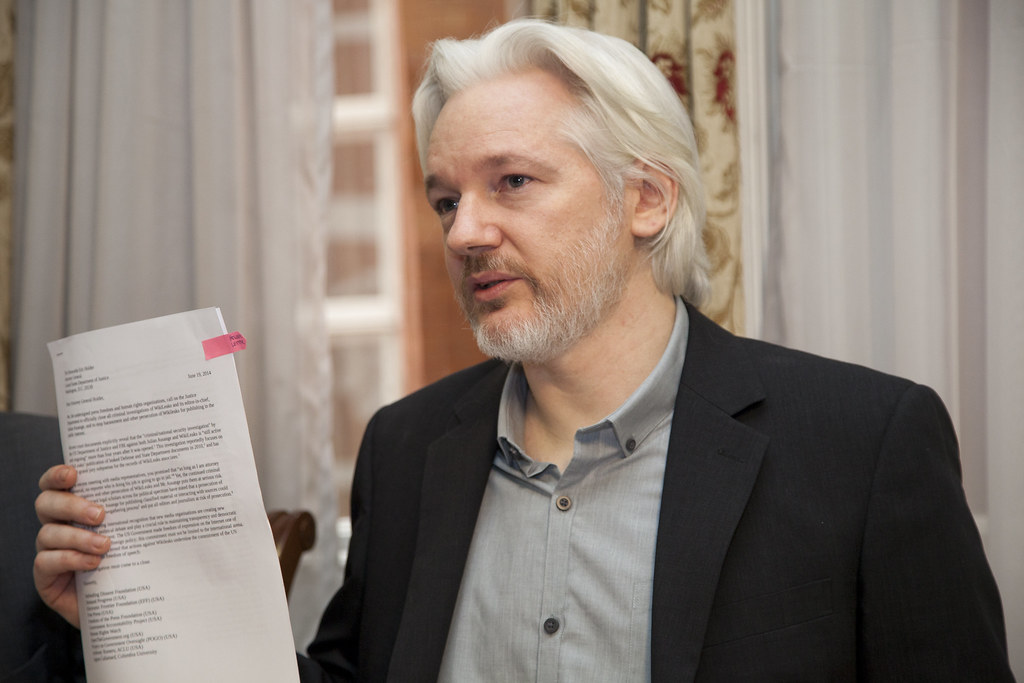Julian Assange: A Case of Journalism, Hacking and Espionage
June 4, 2019 | Expert Insights

Background
Julian Assange is an Australian journalist and computer programmer who founded WikiLeaks in 2006.
The organization is known for revealing war crimes, human rights abuses and corruption. WikiLeaks came to international attention in 2010 when it published a series of leaks provided by Chelsea Manning. These leaks included Collateral Murder video (April 2010), the Afghanistan war logs (July 2010), Iraq war logs (October 2010) and Cable Gate (November 2010). After the leaks, the United States government launched a criminal investigation into WikiLeaks and asked allied nations for assistance.
In 2016, WikiLeaks hosted emails sent or received by candidate Hillary Clinton from her private email server when she was Secretary of State. The U.S. Intelligence Community, as well as a Special Counsel investigation, concluded that the Russian government carried out a hacking campaign as part of broader efforts of interference in the 2016 United States elections.
Analysis
Julian Assange, the WikiLeaks co-founder, has been indicted on 17 new counts of violating the US’s espionage act for his role in publishing classified military and diplomatic documents in 2010, the US justice department announced, in a novel case that raises profound issues around the country’s first amendment of their constitution.
The new charges were part of a superseding indictment obtained by the Trump administration that significantly expanded the legal case against Mr Assange, who is already fighting extradition proceedings in London based on a charge of conspiring to commit unlawful computer intrusion brought by federal prosecutors in northern Virginia.
The secret documents that Mr Assange published were provided by the former US army intelligence analyst Chelsea Manning, who was convicted at a court-martial in 2013 of leaking the records.
Mr Assange was arrested in London in April after being dragged out of the Ecuadorean Embassy, where he had resided for years to avoid capture. The US has asked the UK to extradite Mr Assange, who is fighting it. The Obama administration reportedly rejected the option of a criminal charge against Assange under the Espionage Act, in recognition of the danger to press freedom.
"Julian Assange is no journalist," Assistant Attorney General John Demers pronounced in announcing the indictment. By this reasoning, imprisoning Assange for publishing documents poses no dangers to "real journalists" because press freedoms are inapplicable to Assange.
WikiLeaks published many of those documents in collaboration with an international consortium of leading news organizations — including The Guardian, the New York Times, Le Monde, El País, and Der Spiegel — ensured that the charges against Assange were immediately denounced by journalists and free speech advocates as an unconstitutional assault on press freedom guaranteed by the First Amendment.
The First Amendment of the US Constitution states: “Congress shall make no law ... abridging the freedom of speech, or of the press...”. But, the U.S. government has now issued a legal document that formally declares that collaborating with government sources to receive and publish classified documents is no longer regarded by the Justice Department as journalism protected by the First Amendment, but rather as the felony of espionage.
Counterpoint
The Espionage Act of 1917 does not criminalise national security journalism. The law bans the publication of government secrets and offers no explicit protections to the press under the amendment guaranteeing freedom of speech.
In the case of Julian Assange, the charges do not directly relate to his publishing activities. Instead, he faces one count of “conspiracy to commit computer intrusion,” alleging that Assange agreed to help Chelsea Manning by trying to crack the password on a Defense Department computer in order to obtain classified government documents, which would then be leaked to WikiLeaks. Trump’s justice department has argued that by encouraging Chelsea Manning, the whistleblower, to hack material from inside secure servers, and publishing without regard for the safety of people named in the documents, Assange does not fit the definition of a journalist.
Assessment
Our assessment is that a "journalist" can be anyone, regardless of education, credentials or employment status, who informs the public about newsworthy matters. Though Mr Assange is not a conventional journalist, much of what he does at Wikileaks is difficult to distinguish in a legally meaningful way from what traditional news organisations do: seek and publish information that officials want to be secret, including classified national security matters, and take steps to protect the confidentiality of sources.
We feel that justifying the prosecution on the grounds that he is not a journalist gives licence to only those designated by the government, to publish material about powerful actors which is a threat to press freedom.
Since the government routinely over-classifies a wide array of information, it would leave every journalist at constant risk of surveillance and prosecution. We feel that the criminal case against Assange if it were to succeed, would set a powerful precedent for journalists, whistleblowers and other journalistic sources that the US may wish to pursue in the future.
Once the case is established in favour of the government, working with sources to publish classified information is no longer journalism but espionage.
Image Courtesy - David G Silvers. Cancillería del Ecuador.








Comments